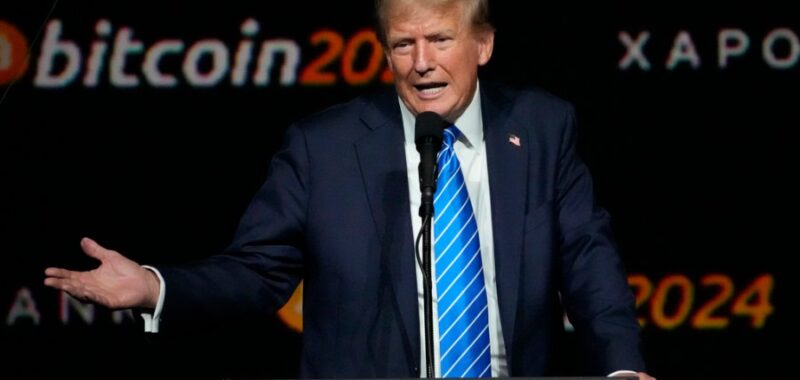
Debank, deplatform and unplug.
These were the watchwords of the Biden White House.
The outgoing administration wreaked havoc on industries it disfavored by cutting access to three critical chokepoints: money, information and energy. Federal bureaucrats used underhanded tactics to stifle emerging tech, like artificial intelligence (AI) and crypto. Among President-elect Trump’s top priorities should be lifting the stranglehold to resuscitate American innovation.
So vast was the regulatory overreach of the Biden administration that it led to the creation of new words. Debanking was foremost among them.
In a stunning interview with Joe Rogan last month, a16z co-founder Marc Andreesen revealed that he worked with 30 tech founders whose bank accounts were shuttered after federal regulators pressured financial institutions to deny services to digital asset companies, and others it deemed politically problematic, in the name of improving “safety and soundness.”
The administration’s most ruthless hitman in this endeavor was the FDIC, which threatened penalties against any bank that held more than 15 percent of its deposits from digital asset companies. The agency then tightened its chokehold by sending letters to multiple banks directing them to “pause all crypto activities.”
The government crackdown on crypto, which has become known as “Operation Chokepoint 2.0,” left countless companies without bank accounts in the United States. It drove dozens of startups out of business and forced others offshore.
Sadly, the debanking scandal was part of the Biden administration’s efforts to disempower voices, journalists and industries it disliked. Remember that before debanking, there was deplatforming. As the Twitter Files revealed, the White House and its surrogates applied significant pressure on social media companies to ban and censor opinions that violated the government narrative during the COVID pandemic.
But it wasn’t just political pundits and journalists the Biden administration threatened to deplatform; it was entire realms of mathematics.
After Andreesen laid bare the disturbing details of the debanking scandal, he related a meeting he had in May with White House officials about AI development. In this meeting, Andreesen reported that Biden aides warned him against funding AI startups because they would ultimately fail. Why? Because the administration intended to create a regulatory moat around a few select AI companies that, in turn, it would be able to control.
The officials even boasted that, if necessary, government could control development of AI by classifying entire areas of mathematics, just as it had classified entire areas of physics during the Cold War. In short, the Biden administration threatened to make certain fields of math illegal to the public, all in an effort to expand its influence.
Incredibly, the administration’s censoriousness didn’t stop at threats to ban math. After seeking to limit opponents’ access to money and information, the administration set its sights on a new attack vector: energy.
The target? Bitcoin.
In 2022, the White House issued an executive order expressing enthusiasm for a government-controlled central bank digital currency, or CBDC. It paired this action with a white paper that proposed policies to “limit or eliminate” Bitcoin mining in the United States.
The administration later made good on this threat by pushing for a 30 percent excise tax on the electricity used by miners. And in 2024, it imposed a mandatory energy audit on all large Bitcoin miners across the United States. The overreach was so blatantly illegal that Bitcoin companies sued the administration — and won.
The intent of all these actions was clear: to centralize control of digital assets and “unplug” Bitcoin miners from the grid. The administration sought to limit miners’ access to energy in the same way it had limited their access to money. Like debanking, “unplugging” was part and parcel of the White House’s efforts to exploit critical chokepoints to control emerging industries.
The good news: President-elect Trump and his newly appointed AI and crypto czar David Sacks can help end the chokepoint operations once and for all.
They should start by investigating the agencies behind the debanking scandal — principally, the FDIC, Office of the Comptroller of the Currency and the prudential regulatory arm of the Federal Reserve. Exposing corruption within these agencies and holding bad-faith bureaucrats to account is essential to prevent weaponization of the banking system in the future. Trump’s team must ensure that banking is neutral and immune from politicization by implementing laws and regulations mandating fair access to financial services for legal activities.
While the Biden administration used energy as a chokepoint in an attempt to suffocate the Bitcoin ecosystem, the Trump administration should take the opposite course. It can do this by researching and publicizing the benefits of partnerships between Bitcoin miners and energy producers, which can lead to more generation, less wasted power and more resilient grids.
Forging a partnership between power producers and miners is key to achieving what Trump calls “energy dominance.” Becoming energy dominant will help our country scale power generation to new levels, which will also ensure that the United States remains the world’s leader in AI. To complement these efforts, the new administration should also help Congress pass a comprehensive crypto framework, providing the regulatory clarity the industry needs to bring innovation and investment back home.
The Biden administration sought to suffocate our most promising technologies by choking access to money, information and energy. But the stranglehold ends on Jan. 20. Trump and Sacks can breathe new life into AI and crypto with a pro-innovation agenda that champions new technologies instead of suppressing them.
Brian Morgenstern is the head of public policy for Riot Platforms. He is on the board of the Texas Blockchain Council and the executive committee of the Chamber of Digital Commerce. He served as deputy assistant secretary of the U.S. Treasury Department and special assistant to the president in the Trump administration. Sam Lyman is the director of public policy for Riot Platforms, Inc., the former chief speechwriter to Sen. Orrin G. Hatch (R-Utah), and the former speechwriter to the president and CEO of the U.S. Chamber of Commerce.

